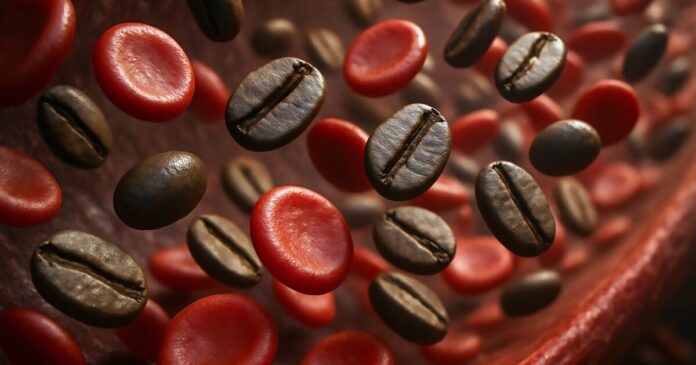Your morning coffee might do more than wake you up – it could weaken donated blood. A large new study shows caffeine lowers red blood cell quality, making transfusions less effective, especially in patients who need them most.
Globally, about one billion people drink coffee, which equates to 12.6% of the planet’s population. Over 2.25 billion cups of coffee are consumed globally every day, providing approximately one billion people, or 12.6% of the world’s population, with their fix.
Overall, research on caffeine has found that it benefits health. However, a new study led by the University of Colorado Anschutz Medical Campus has found that caffeine may reduce the quality of donated blood, as well as its effectiveness when transfused.
“We’ve long understood caffeine’s effect on the brain and central nervous system, but this is the first large-scale study to demonstrate its impact on RBC [red blood cell] biology,” said the study’s corresponding author, Angelo D’Alessandro, PhD, professor of biochemistry at the University of Colorado School of Medicine. “These findings suggest that something as common as your morning cup of coffee could have important implications for the quality of stored blood and how well it works when transfused into patients.”
Blood is comprised of plasma, a straw-colored liquid, in addition to formed elements: red blood cells (erythrocytes), white blood cells (leukocytes), and platelets (thrombocytes). Plasma, which contains water, proteins, sugars, and other substances, makes up about 55% of blood volume, while the formed elements, which make up the other roughly 45%, are suspended in it.
The researchers analyzed RBCs from 13,091 blood donors as part of a large US blood bank study, REDS RBC-Omics. They measured caffeine levels in stored blood and checked how it affected RBC metabolism, hemolysis (cell breakage), and transfusion outcomes. The 643 donors found to have very high or very low RBC fragility were recalled and asked to donate blood again, allowing repeated treating over multiple storage times: 10, 23, and 42 days.
Eight healthy volunteer study participants drank a cup of coffee, and their blood was tested before and after to track caffeine’s short-term effects on RBCs. In the lab, the researchers examined how caffeine interacted with key RBC pathways, especially ADORA2b signaling (a receptor that normally helps RBCs adapt to stress and hypoxic or low oxygen conditions) and G6PD enzyme activity (which protects RBCs from oxidative damage). Mice genetically lacking ADORA2b were studied to confirm mechanisms of action, including post-transfusion recovery with and without caffeine exposure.
Many donors had measurable caffeine in their RBCs. Levels were consistent across repeat donations, especially in frequent coffee drinkers. The researchers noted that higher caffeine levels were associated with lower stores of adenosine triphosphate (ATP) and 2,3-bisphosphoglycerate (2,3-BPG). RBCs don’t have a nucleus or the energy-producing machinery called mitochondria, so they can’t make energy the same way other cells do. Instead, they rely on a few chemical “fuel molecules” to stay alive and do their job. Two of the most important ones are ATP and 2,3-BPG.
They also found that caffeine caused RBCs to become more fragile, more prone to breaking under stress, and the cells showed more oxidative damage. After transfusion, blood from high-caffeine donors led to smaller hemoglobin increases in patients. In simple terms, caffeine seemed to drain the RBCs’ “battery” and reduce their ability to deliver oxygen to the tissues.
Donors with common genetic variants in ADORA2b had even worse outcomes when caffeine was present. This combination made stored RBCs especially vulnerable. Mice lacking ADORA2b already had fragile RBCs. Adding caffeine during storage made the problem worse, showing a double hit: caffeine blocked ADORA2b signaling and directly inhibited G6PD, reducing antioxidant protection.
“The translational implications of our findings are significant,” said D’Alessandro. “First, donor caffeine consumption, a common dietary exposure for up to 75% of Americans, emerges as a modifiable behavioral factor potentially influencing RBC storage quality and transfusion outcomes. Given caffeine’s short biological half-life, transient dietary modifications around the time of blood donation might mitigate its negative impact, aligning with blood donation guidelines in several European countries where donors are advised to limit caffeine intake prior to donation.”
The study’s limitations include that only eight volunteers drank coffee for the metabolic test, and none were caffeine-naïve (that is, never consumed caffeine). The donor samples were around 10 years old, and while storage methods haven’t changed much, demographics or habits may differ today. RBC physiology in mice isn’t identical to that of humans. The clinical impact on transfusion outcomes was modest, so the real-world risk per patient may be small, yet meaningful at a population scale.
The study raises some interesting real-world applications, particularly in the context of blood donation for transfusion. Taking more of a precision medicine approach by matching donor lifestyle, such as caffeine habits, and genetics, like ADORA2b variants, with recipient needs could improve outcomes. High-risk patients, such as newborns and the critically ill, might benefit from a transfusion from low-caffeine donors.
The study was published in the journal Haematologica.


